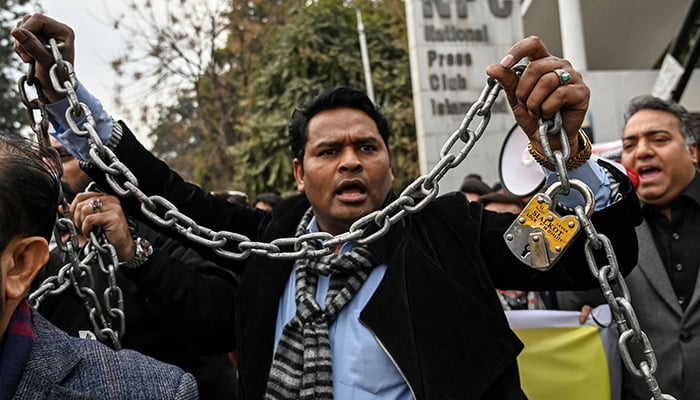Peca amendments: 'These actions paving way for civilian martial law'
PM's aide Barrister Malik defends govt's move, says law is for all Pakistanis instead of a specific fraternity
The introduction of Prevention of Electronic Crimes (Peca) (Amendment) Bill 2025 continues to draw sharp criticism as senior journalist Mazhar Abbas called on Wednesday the government's move undemocratic and authoritarian.
The amendments, which sailed through both the National Assembly and the Senate, aim to clamp down on individuals spreading misinformation and fake news on social media, according to the government. The passage of controversial law has sparked nationwide protests by the journalist fraternity and opposition parties.
"Gagging the press is against democratic values. These actions are taking us towards civilian martial law," Abbas said while speaking on Geo News programme "Geo Pakistan".
He argued that the proposed law closely resembles the one the previous government attempted to introduce.
In 2016, the Pakistan Muslim League-Nawaz (PML-N) government introduced Peca and its successor, Pakistan Tehreek-e-Insaf (PTI) government then brought in an even stricter version, and now the incumbent government was now bringing the "worst law" yet, he remarked.
"They are banning your thoughts. You cannot even think [freely], otherwise, it can be interpreted speaking against someone," the journalist warned.
Abbas went on to say that the successive governments first censored writing, then images, and now speech. "In reality, they are trying to kill or massacre the media," he added.
Addressing the government's justification for the amendments, Abbas questioned the definition of fake news.
"They claim they want to regulate misinformation on digital media. But what is fake news? If I say today that the February 8 election was rigged, does that make it fake news? No, it is an opinion — something that can be debated," he explained.
The journalist cautioned against rushing legislations, calling such actions dangerous. He questioned the urgency behind the amendments, pointing out that governments often find themselves opposing the very laws they once enforced.
"Why the rush?" he asked. "This government, once out of power, will be the first to suffer under this law."
He also warned that if the opposition were to come into power, it could impose even stricter measures. "The next government, if formed by the current opposition, could be worse," he remarked.
Abbas accused the government of falsely claiming it had consulted stakeholders before introducing the Peca amendments.
"They are lying. When the PTI government was in power, they held consultations. When PML-N was in power, Marriyum Aurangzeb herself admitted she was unaware that such a law was being introduced," he recalled.
However, he appreciated the senior Punjab minister for taking action against relevant officials.
Abbas criticised the prevailing mindset that seeks to control the media, stating that "true consultations involve an exchange of drafts, not just claims."
He called on Federal Information Minister Ataullah Tarar to disclose the drafts purportedly shared with journalist organisations if the government had truly engaged in multiple rounds of discussions.
'Govt neither hasty nor rigid'
Meanwhile, Adviser to the Prime Minister on Law and Justice Aqeel Malik offered a differing perspective, arguing that the government was neither hasty nor rigid in its approach and that consultations had indeed taken place.
"This matter has been under discussion for the past three to four years. Even when Marriyum Aurangzeb was the information minister, consultations were held, and the government incorporated many suggestions," Malik, a lawyer by profession, said during the same show.
He noted that discussions had taken place during Senate committee sessions but emphasised that "not everything needs to be included in an act of parliament — some aspects should be left to the rules."
Defending the government's position, Barrister Malik cited international examples, pointing out that Australia has banned social media for children under 16 and that the United States has separate legislation on fake news for each state.
He also referenced the fake news surrounding the Southport killings in the United Kingdom, which led to further violence.
"Maintaining that this issue should not be addressed, I think is wrong. There is an element of intent in it. It is for all Pakistanis. The fraternity has not been targeted in it," Malik concluded, stressing the need for legal measures to counter misinformation and disinformation.
-
Security forces gun down 30 terrorists in multiple IBOs in KP: ISPR
-
MQM-P calls for new province in Sindh
-
US report validates Pakistan military edge over India: PM
-
Banned TTP poses serious threat to Pakistan security: UNSC panel
-
CM Afridi clarifies remarks on by-poll after ECP requests army deployment
-
Dubai sees 3.2m Pakistani passengers in 2025 as airport sets new milestone
-
Security forces kill 23 Indian proxy terrorists in KP's Kurram
-
Pakistan to construct island to boost oil exploration: report












